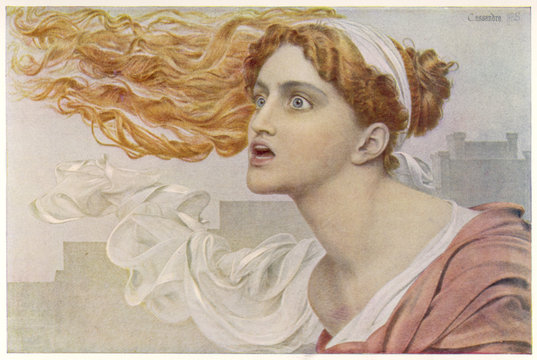Bachelard, Gaston. 1949. Le Rationalisme appliqué. Paris: PUF.
Bigliazzi, Silvia, ed. 2017. The Tyrant Fear, special issue of Comparative Drama 51 (4).
Crippa, Sabina. 1990. “Glossolalia. Il linguaggio di Cassandra”. Studi italiani di linguistica teorica applicata 19 (3): 487-508.
Doherty, Lillian, 2002. Gender and the Interpretation of Classical Myth. London: Duckworth.
Dodds, E.R. 1951. The Greeks and the Irrational. Berkeley: The University of California Press.
Ferruta Anna. 2010. La Cassandra di Christa Wolf: tra veggenza, cecità, memoria del futuro. In Al femminile, a cura di Sandra Teroni. Firenze: NICOMP L.E.
Hardwick, Lorna, and Harrison, Stephen J., eds. 2013. Classics in the Modern World: A ‘Democratic Turn’? Oxford: Oxford University Press.
Hardwick, Lorna, and Stray, Christopher. 2008. A Companion to Classical Receptions. Oxford: Blackwell.
Harrison, Stephen J., ed. 2009. Living Classics: Greece and Rome in Contemporary Poetry in English. Oxford: Oxford. University Press.
Heirman, L.J. 1975. “Kassandra’s glossolalia”. Mnemosyne 28 (3): 257-67.
Guidorizzi, Giulio. 2009. Ai confine dell’anima. Milano: Raffaello Cortina Editore.
Yergeau, Melanie. 2020. “Cassandra Isn’t Doing the Robot: on Risky Rhetorics and Contagious Autism”. Rhetoric Society Quarterly 50 (3): 2012-21.
Klein, Melanie. 1963. “Some Reflections on The Oresteia”. In Klein, Melanie. Envy and Gratitude. And Other Works, 1946-1963, 275-299. London: Vintage.
Layton Schapira, Laurie. 1988. The Cassandra Complex. Living with Disbelief: a Modern Perspective on Hysteria. Toronto: Inner City Books.
Macintosh, Fiona, Justine McConnell, Stephen Harrison, and Claire Kenward, eds. 2018. Epic Performances from the Middle Ages into the Twenty-First Century. Oxford: Oxford University Press.
Macintosh, Fiona, Pantelis Michelakis, Edith Hall, and Oliver Taplin, eds. 2005. Agamemnon in Performance 458 BC to ad 2004. Oxford: Oxford University Press.
Martindale, Charles, and Richard F. Thomas. 2006. Classics and the Use of Reception. Oxford: Blackwell.
Mazzoldi, Sabina. 2001. Cassandra, la vergine e l’indovina. Identità di un personaggio da Omero all’Ellenismo. Pisa – Roma: Istituti editoriali e poligrafici internazionali.
Morvan, Anne. 2024. Chi sono le vere troiane? Cassandra emarginata dal coro: formazione di un’identità tragica, da Euripide a Seneca. In Margini e marginalità: per un’analisi multidisciplinare delle figure e dei contesti. Atti del seminario Semi di Sapienza 2023 (22-23 giugno 2023), a cura di John Thornton e Pietro Vannicelli, 57-66. Roma: Quasar.
Pillinger, Emily. 2010. Translating Classical Visions in Berlioz’s Les Troyens. Arion: A Journal of Humanities and the Classics 18 (2): 65-104.
Pillinger, Emily. 2019. Cassandra and the Poetics of Prophecy in Greek and Latin Literature. Cambridge: Cambridge University Press.
Pillinger, Emily. 2022. The music of Iannis Xenakis’ estranged Kassandra. Classical Receptions Journal 14 (1): 70–88
Ragni, Cristiano. 2025, forthcoming. Re-fashioning Antiquity: Richard Barnfield’s Cassandra. In Richard Barnfield’s Poetics. Early Modern English Poetry Beyond Shakespeare, edited by Camilla Caporicci, Fabio Ciambella, and Cristiano Ragni. London: Bloomsbury The Arden Shakespeare.
Ratcliffe, Krista. 1995. “Listening to Cassandra: A Materialist-Feminist Exposé of the Necessary Relations between Rhetoric and Hermeneutics.” Studies in the Literary Imagination 28 (2): 63–77.
Shakespeare, William. 2005. Troilus and Cressida (Shakespeare in production series). Edited by Frances A. Shirley. Cambridge: Cambridge University Press.
Theodorakopoulos, Elena ed. 2012. Translation, Transgression, Transformation: Contemporary Women Authors and Classical Reception, special issue of Classical Receptions Journal 4 (2).
Wright, Laura Jayne. 2023. Shakespeare’s Visionary Women. Cambridge: CUP.

